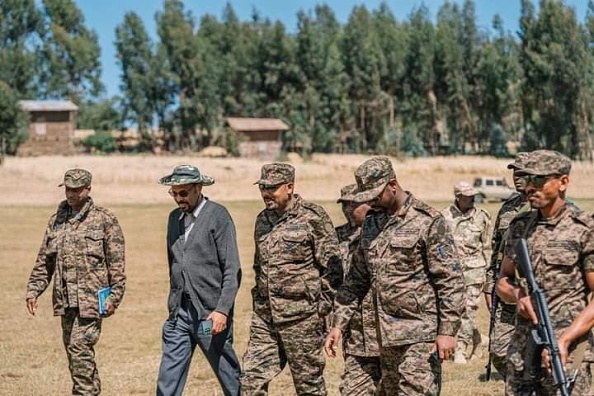Addis Ababa – Ethiopia said on Wednesday that pro-government forces had recaptured the Unesco World Heritage site Lalibela, which fell to Tigrayan fighters in August, as Prime Minister Abiy Ahmed’s administration seeks to wrest back territory from the rebels.
After the rebels claimed major territorial gains as part of an advance on the capital Addis Ababa, Abiy announced last week that he would head to the battlefield as fighting reportedly rages on at least three fronts in the country.
Since then, the government has announced that it has taken back control of several small towns, including Shewa Robit, around 220km (135 miles) northeast of the capital by road, and most recently Lalibela which is famed for its 12th-century rock-hewn churches.
Pro-Abiy forces have “captured the historical town of Lalibela and Lalibela international airport,” the government communications service said in a statement read out on government-affiliated Walta TV.
ALSO READ | Ethiopia govt claims retake of town near capital
The statement added that pro-government forces were also “marching on Sekota city” in the Amhara region in northern Ethiopia, even as fighting reportedly spreads to Debre Sina, a town located less than 200 kilometres northeast of Addis Ababa by road.
In a statement Wednesday night, the Tigrayan People’s Liberation Front (TPLF) military command denied the government was scoring major gains, saying instead the rebels were “making territorial adjustments on our own terms” ahead of “strategic offensives”.
“The war is ending definitively. The situation cannot be reversed after reaching here,” the statement said.
The conflict, which erupted in November 2020, took a sharp turn around a month ago, when the TPLF claimed to have captured the strategic towns of Dessie and Kombolcha, located on a key highway to the capital.
ALSO READ | Ethiopia PM Abiy Ahmed claims war gains, urges rebels to ‘surrender’
But earlier Wednesday, government spokesperson Legesse Tulu said Ethiopian forces would “in a short period of time” retake Dessie and Lalibela, both of which are located in Amhara.
The war broke out when Abiy sent troops into the northernmost Tigray region to topple the TPLF – a move he said came in response to rebel attacks on army camps.
But the rebels mounted a shock comeback, recapturing most of Tigray by June before expanding into the neighbouring regions of Amhara and Afar.
In recent days, state media has broadcast images of a uniformed Abiy, a former lieutenant colonel in the military, in what appeared to be the Afar region.
On Sunday, state media claimed the army controlled the lowland Afar town of Chifra, and Abiy said Tuesday such gains would be replicated in Amhara.
Mounting alarm
Fears of a rebel march on Addis Ababa have prompted the United States, France, Britain and other countries to urge their citizens to leave Ethiopia as soon as possible, though Abiy’s government says TPLF gains are overstated and the city is secure.
The fighting has killed thousands, displaced more than two million and driven hundreds of thousands into famine-like conditions, according to UN estimates.
UN Secretary-General Antonio Guterres said Wednesday that despite the fighting, humanitarian flights and convoys to Tigray had resumed, announcing the arrival of 157 trucks in Mekele.
“Humanitarian aid is effectively restarted, probably not as much as we would like. But that is a good signal and the UN flights between Mekele and Addis have been re-established,” he told reporters.
The mounting humanitarian toll has also sparked alarm among Western nations, particularly the US, which once saw Nobel Peace Prize winner Abiy as a reformer and key ally.
ALSO READ | Ethiopia PM Abiy says military will ‘destroy’ Tigray rebels
Although Washington has been openly critical of Abiy’s handling of the war, China and Russia have been more circumspect.
Ethiopia’s foreign ministry on Wednesday tweeted images of a press briefing by China’s top diplomat Wang Yi during his visit to the country, quoting him as saying: “China stands against any interference in Ethiopia’s domestic affairs.”
Olusegun Obasanjo, the African Union’s special envoy for the Horn of Africa, is leading a push to broker a ceasefire, though there has been little sign so of progress so far.
Moussa Faki Mahamat, chairperson of the African Union Commission, said in a Twitter post Wednesday that Obasanjo would press on with his efforts but that “unfortunately the hostilities continue”, reiterating his call for a ceasefire.
Federal officials have previously said that the rebels must pull out of Amhara and Afar before a “peaceful solution” could be found, something the TPLF has dismissed as a nonstarter.
Follow African Insider on Facebook, Twitter and Instagram
Source: AFP
Picture: Getty Images
For more African news, visit Africaninsider.com


